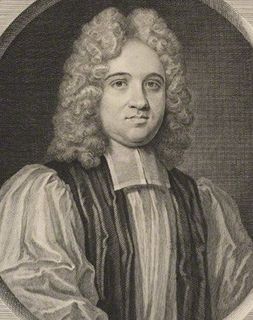Related Research Articles

John Goodwin (1594–1665) was an English preacher, theologian and prolific author of significant books.

Sir William Dawes, 3rd Baronet, was an Anglican prelate. He served as Bishop of Chester from 1708 to 1714 and then as Archbishop of York from 1714 to 1724. Politically he was a Hanoverian Tory, who favoured the Hanoverian Succession.
Isaac Barrow was an English clergyman and Bishop, consecutively, of Sodor and Man and St Asaph, and also served as Governor of the Isle of Man. He was the founder of the Bishop Barrow Trust. During his time as Bishop of Sodor and Man and Governor of the Isle of Man, he enacted significant social, political, and ecclesiastical reforms. He is sometimes confused with his more famous namesake and nephew, Isaac Barrow (1630–1677), the mathematician and theologian.

George Coke or Cooke was successively the Bishop of Bristol and Hereford. After the battle of Naseby in 1645, Hereford was taken and Coke was arrested and taken to London. He avoided charges of High Treason in January 1646 and died in Gloucestershire that year.

Edward Waddington (1670?–1731) was an English prelate, bishop of Chichester from 1724 to 1731.

Thomas Wharton (1614–1673) was an English physician and anatomist best known for his descriptions of the submandibular duct and Wharton's jelly of the umbilical cord.
Thomas Bainbrigg (Bainbridge) was an English college head.
Walter Haddon LL.D. (1515–1572) was an English civil lawyer, much involved in church and university affairs under Edward VI, Queen Mary, and Elizabeth I. He was a University of Cambridge humanist and reformer, and was highly reputed in his time as a Latinist. He sat as an MP during the reigns of Mary and Elizabeth. His controversial exchange with the Portuguese historian Jerónimo Osório attracted international attention partly on account of the scholarly reputations of the protagonists.
Samuel Collins (1576–1651) was an English clergyman and academic, Regius Professor of Divinity at Cambridge and Provost of King's College, Cambridge.
Roger Goad (1538–1610) was an English academic theologian, Provost of King's College, Cambridge, and three times Vice-Chancellor of the University of Cambridge.
Thomas Goad (1576–1638) was an English clergyman, controversial writer, and rector of Hadleigh, Suffolk. A participant at the Synod of Dort, he changed his views there from Calvinist to Arminian, against the sense of the meeting.

Henry Scudder was an English minister of presbyterian views, known as a devotional writer, and member of the Westminster Assembly.
John Rosewell was Headmaster of Eton College, England (1671–1682).
Francis Hare (1671–1740) was an English churchman and classical scholar, bishop of St Asaph from 1727 and bishop of Chichester from 1731.
William Malim (1533–1594) was an English academic, schoolmaster and Neo-Latin author.
Thomas Hatcher was an English antiquarian.
William Hayward Roberts was an English born schoolmaster, poet and biblical critic, cleric and Provost of Eton College.
Thomas Thackeray was a Church of England clergyman who taught at his old school, Eton College, and ended his career as Head Master of Harrow School. He received the degree of Doctor of Divinity (DD).
References
- ↑ "Goad, George (GT623G)". A Cambridge Alumni Database. University of Cambridge.
. Dictionary of National Biography . London: Smith, Elder & Co. 1885–1900.